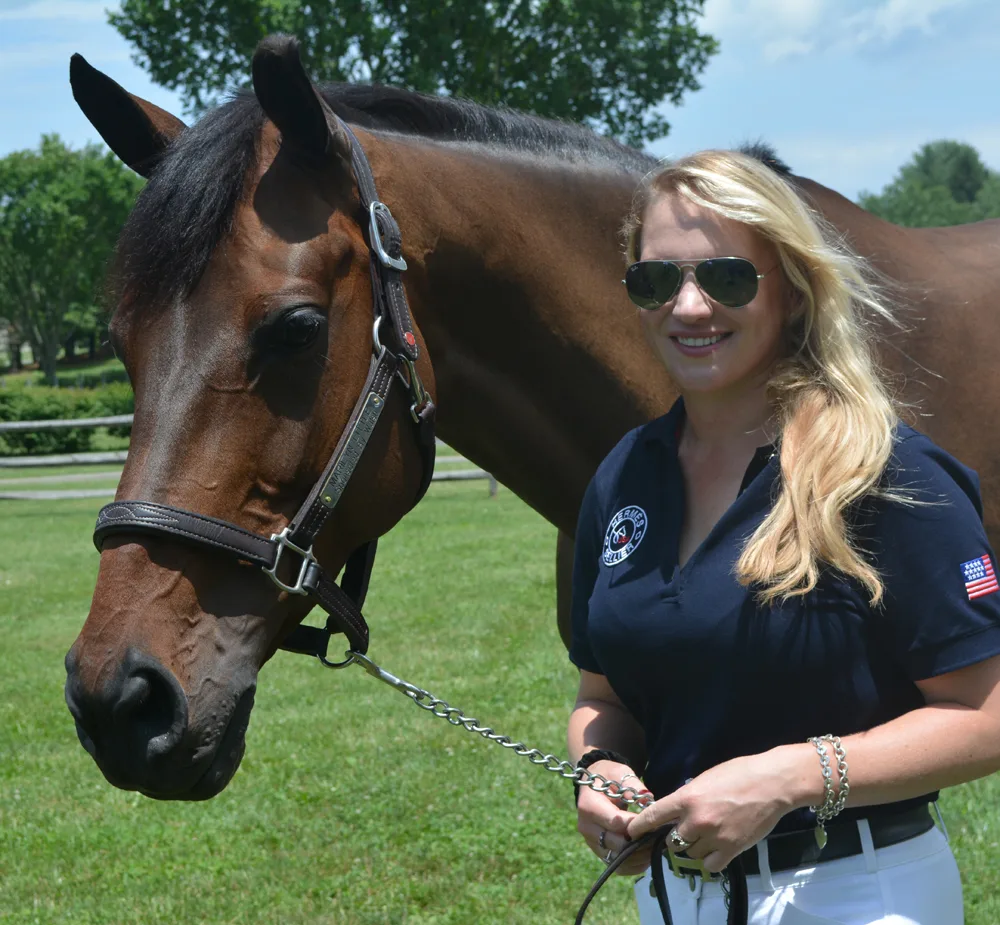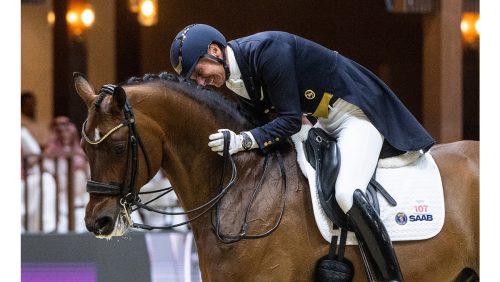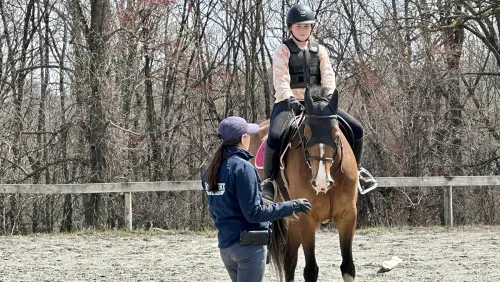In our July 13 Eventing Issue, the cover story is all about Marilyn Little and how she added four-star eventing to her grand prix show jumping resume in a matter of a few years. She talks about overcoming public criticism and finding her way in her new sport. She also reveals how she had to rethink her riding and discusses what she loves so much about eventing.
Little’s parents, Ray and Lynne, have built a solid reputation as a source for sales of talented horses in the hunter/jumper world. And Marilyn is quickly becoming known for her eye for an eventer as well. Horses with the RF prefix—indicating they came through the Little family’s Raylyn Farm sales—dot the results of events all over the country.
Karen O’Connor admires Marilyn’s ability to find quality horses not just for herself to ride, but also for other riders. “She has a standard of horse that she stands behind, and it’s unwavering,” O’Connor said. “There are many people who will find a horse for you, but there isn’t a minimum standard. There absolutely is a definite standard of excellence that she is proud to put the RF name in front of. She’s been able to bring a lot of lovely horses into the sport, and they’re starting to come up to the three- and four-star level now.”
So we asked Marilyn about how she sources equine talent and what she loves about eventing…
Chronicle: What was the biggest adjustment you had to make to riding cross-country from your horse show background?
Little: Cross-country, unlike show jumping or equitation or hunters, is a lot about ad libbing. You’re able to ad lib and make it up as you go along out there because of the diligence of the preparation in the months and the years leading up to it, both for yourself and for your horse.
I was shocked when I walked the cross-country courses in the beginning and said to people, “How many strides are you going to do there?” and they replied, “Five or six, maybe a seven.” I remember thinking they were joking. Then I was really shocked when they’d say, “Well, I’m going to do two or three strides.” Two OR three?
I was coming from a culture of “it is or it isn’t.” It is two strides, or it is three, and it’ll go best as one or the other. I was shocked that it was even a possibility and that it was an accepted way of going about it, but on cross-country that really is what it is. If it doesn’t work out, you have to pick up the knitting and carry on.
You’re able to do that because of all the little details you’ve been so diligent and stringent about and the meticulous nature of the training involved.
What do you look for in a horse?
Little: At the end of the day, people are coming to me for horses because I choose a certain type of horse, which is the type that I’d choose for myself. I choose horses that I’d like to ride, even if they’re for other people.
Choosing eventers is very difficult. Do you go for movement? Thoroughbred factor? Jump?
I go for trainability, character and natural athleticism. I look for natural inclination to jump instead of raw scope. An ease and efficiency of movement and a self-propelling gallop instead of pure Thoroughbred blood. I look for balance, cadence and relaxation rather than super movement. I think trainability and consistency of character are the ultimate qualities you need.
What weaknesses can you forgive in a prospect?
ADVERTISEMENT
In show jumping, we make great exception for a horse who has some flaws, like the horse who doesn’t have a great canter, or who doesn’t have a great front end, but you can help it. We make great exception in show jumping for difficulty of mouth or head carriage or classic technique.
Eventers really need to be good at so many things. On the flip side, there’s an incredible gray area of eventing that allows so many different types of horses to event.
My type of horse is ultimately trainable and with an incredibly consistent character. Rather than looking for a checklist of qualities that I “have to have,” I think about an ideal that encompasses those qualities and evaluate how close they are to that.
Then the pool of horses you come up with is reasonably large. When you walk in my barn, they all look quite different. I’ve had a lot of people tell me, “Your horses have something about them that’s all the same.”
They don’t look the same, and they literally go from 15.1 to 18.1 hands. But they all have a twinkle in their eye that’s the same.
Do you look at horses with a specific discipline in mind?
People see me on a horse and now ask me, “Is that a jumper or an eventer?” I consider that a compliment, because the stigmatism of what is an “eventer” in the show jumping world, as I used to be aware of it, is that it’s the horse that’s not good at any one thing. It’s the one they pull out of the back of the stable who isn’t quiet enough to be a hunter, isn’t careful enough to be a jumper, and doesn’t move well enough for dressage. That is so not an eventer at all.
It’s kind of been the big mission of the RF horses to change that perception. Event horses are special horses. It’s fun for me to watch the worlds collide, and at the end of the day, I think a good horse is a good horse.
I can walk into almost any stable in the United States or in Europe, and if someone says “I have an eventer—or a jumper, or a hunter—for you to look at,” I may not like the horse for whatever career they’re presenting it as, but I probably have a pretty good idea of what it might be good at.
I look at horses as a clean slate. I have the privilege of evaluating the horse on its own terms, asking, “What does this horse want its job to be?” And I can place it accordingly. That’s so much fun for me.
So, do the event horse sales support your eventing career?
The RF eventers I’ve found and helped to bring to the United States and place with new owners—that’s been a privilege and a lot of fun, but it doesn’t support competing.
At the highest levels, eventers are selling for in the vicinity of what show jumpers are, but in general, they’re not selling for nearly as much as they’re worth. The time, expertise and risk involved in creating a high performance eventer—you can’t even compare. I could make 10 show jumpers in the time it takes to make two eventers.
Why aren’t they more expensive? I think the time is coming.
ADVERTISEMENT
But at this point, I’ve been honored to be involved in some of the careers of some of the professionals in this country, to have been asked to help find them horses, and that’s been so much fun.
But that’s not what’s supported my eventing career. The family business of sales of show horses are doing that. We sell probably three show horses—jumpers, hunters or equitation horses–for every eventer we sell.
So what’s your business model going forward?
That’s a real work in progress. There’s a very big question mark there.
At the end of the day, we all have things we want to do, and I’ve been very lucky to have been able to run after a lot of dreams. We’ve been creative enough to make it possible. But there is a question mark in terms of longevity.
It does come down to owners, supporters and sponsors. The past four or five years have been a whirlwind, and I’ve had some amazing support from wonderful owners and people. But as much effort as I’ve put into the competitive side of the sport, I do need to try and figure out how this can work financially going forward.
I’m coming to a fork in the road. I have a very, VERY special group of young jumpers right now who in the next two years are going to be ready to step into international sport.
It’s the group of horses that I wished I’d had in 2010. It’s the group of horses that I didn’t have then, which allowed me to be curious about eventing and explore it. Now, perhaps because I’ve taken a breath and not been trying so hard to find them, I have them. They are tucked away. I’ve bred some of them and bought some of them and been developing them quietly.
I’m desperate to try and find a way to make [the eventing career] work because I love the sport. But this is a family business, and the family has supported me, but I’ve kind of put the business on hold a bit on my end.
I’m lucky to have the support of a fantastic group of owners, and without them I wouldn’t have this group of horses. But I also need to try and find a way to expand and get more people involved to help make this happen. Without owners, riders are just walking around on our own two feet.
 |
The article “Demystifying Marilyn” appears in the Chronicle’s July 13 Eventing Issue. Do you think you know Marilyn’s story? You probably don’t. From disparaging internet rumors to setbacks she had to think her way through, Marilyn’s road to the top hasn’t been easy. “People thought I was trying to be in the sport quickly, but if you love a sport, who doesn’t want to be as involved as you can as soon as you can?” Marilyn asks. “I was fascinated by the sport, respected it, and was hungry to learn about it. But it doesn’t mean I was rushing; I just wanted very badly to be part of it.” |















